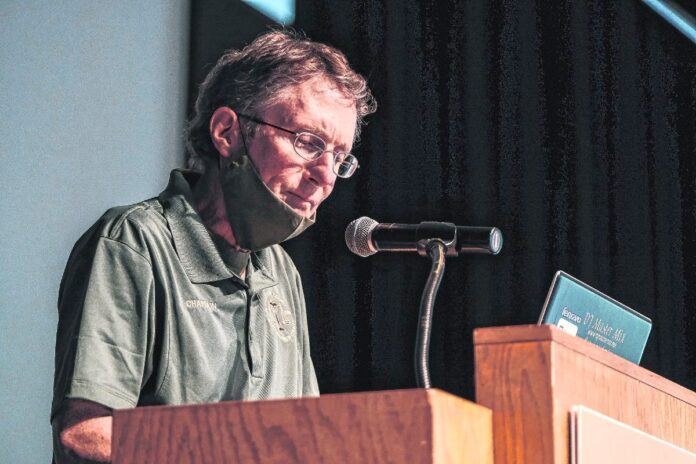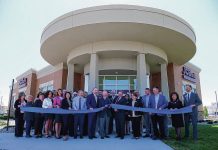
“I am a veteran. Thank you for believing in me and giving me the opportunity to be a proud veteran again. I am a veteran. I was a member of America’s military. I served the people of the United States of America. I was a guardian of freedom and the American way of life.”
These words were read Thursday by Indiana Supreme Court Justice Steven David, as he presented six individuals with a framed copy of what he called “The Veteran’s Treatment Court’s Participant’s Creed.”
The Bartholomew County Veteran’s Treatment Court conducted its graduation ceremony for six veterans who have completed the program. The event was held in the Commons on Thursday and streamed over Zoom for some audience members and one graduate who could not attend in person.
David, who served in the United States Army Judge Advocate General’s Corps and retired at the rank of colonel, was one of the speakers at the ceremony. The keynote speaker for the event was Columbus native Congressman Greg Pence, R-Ind., who served in the Marines.
[sc:text-divider text-divider-title=”Story continues below gallery” ]Click here to purchase photos from this gallery
“No matter what led you to this day, deep down, you know there was something more to life than a mistake or a bad decision, and that’s actually why you went into the military to begin with,” Pence said. “You wanted something more out of life. You sought out something braver, better and brighter. You sought a second chance here, after your service, and a fresh new start. That’s what led you to this important day.”
Bartholomew County Superior Court I Judge James Worton, who oversees the treatment court, said the program is a “problem-solving treatment course” focused on helping veterans who have service-related issues such as post-traumatic stress disorder or substance misuse disorders.
“It is a program that offers treatment alternatives that connect veterans with their earned VA benefits,” Worton said. “And even if we have a veteran, such as a National Guardsman … that was not deployed so they wouldn’t be qualified for VA benefits, we also have programs through local treatment facilities here that assist them as well. And the treatment is specified for issues pertaining to veterans, because they have very, very specific issues and needs that we try to address during the treatment program.”
The court is designed to address causes that lead veterans to be charged with criminal offenses. The prosecutors office can screen out any referred individual based on charges, with general exclusion for serious or forcible felony offenses. Worton has the final say on who is allowed to participate.
Veterans who complete the program typically get their charges reduced or dismissed and are also unlikely to return to court for criminal offenses.
He added, however, that not all participants stick with the program.
“It’s not for every veteran,” he said. “It’s not for every person that goes through it. Sometimes it’s too intense, and we have had people that have been kicked out of the program. We’ve had people that have dropped the program. It is voluntary. They have to want to be in there.”
The treatment court program includes five “levels” that must be completed to graduate. Each level includes requirements for drug screenings, court visits and meeting with case managers.
Worton said that most participants take 20 to 24 months to complete the program, though some finish in as little as 15 months. He also that while the levels are the same for all participants, treatment varies based on the individual’s needs.
Once a veteran finishes the program, there is an informal ceremony held in court, where the participant receives the benefits of their completion, and he or she is added to the list of participants for the next official graduation ceremony. Worton said that, on average, the program holds about two ceremonies a year and tries to have a minimum of three to four participants in the ceremony.
Thursday’s ceremony was originally scheduled for April but delayed due to COVID-19. Worton said that most of the graduates finished the program prior to April. He added that these six graduates have been doing well since they finished.
At the ceremony, graduates were presented with challenge coins, letters of recognition from Chief Justice Loretta Rush of the Indiana Supreme Court, Veteran’s Treatment Court masks and framed copies of the Veteran’s Treatment Court’s Participant’s Creed. One graduate, Tony Gibson, also received his diploma because it was his last official day of the program.
One graduate, Shane Herron, attended over Zoom and thanked the staff members and other participants for all they had done for him.
“All these people participated in helping me from, like, the lowest point of my life,” he said. “… You guys always did the best you could and got me everything I needed. So I just want to say thank you.”
Worton said that he is very proud to be involved with the treatment court.
“I think it provides a path for veterans to regain their mission,” he said. “And any veteran will know exactly what I’m talking about when I say that. In other words, somebody who has signed the dotted line to serve our country, and something happened during that service and has led them astray. And this provides a path back on course again.”
David said to the graduates, “You served voluntarily. We owed you. We owe you. You fell down, and this community … chose you, invested in you, and you chose to succeed. And you did. And we’re so proud of you.”
[sc:pullout-title pullout-title=”The graduates” ][sc:pullout-text-begin]
Six participants were recognized in Thursday’s Veteran’s Court graduation. One graduate preferred not to be identified.
In the graduating class were:
Frank Starr – Army
Tony Gibson – Army National Guard
Shane Herron – Army (attended via Zoom)
Andrew Dover – Army
Zach Gruber – Army National Guard
[sc:pullout-text-end][sc:pullout-title pullout-title=”About Veteran’s Court” ][sc:pullout-text-begin]
The Bartholomew County Veteran’s Treatment Court received its provisional certification in 2016 and became fully certified in 2017.
The treatment court is mainly funded by grants from the Indiana Supreme Court. Bartholomew County provides funds to pay the program’s part-time public defender. Some funds for the program also come from fees paid by participants.
To date, 102 veterans have been referred to the program with 48 accepted and entering the program, including veterans from other counties within this judicial district. There have been 25 participants who have graduated, 11 have been unsuccessful and two have withdrawn. Barnes said the program has a 75% retention rate.
Partners include the Bartholomew County Prosecutor’s office, defense attorneys, Court Services, veterans’ service agencies, law enforcement, social service agencies, treatment providers, veteran mentors, the Indiana Office of Court Services, the Indiana Supreme Court and the National Association of Drug Court Professionals.
[sc:pullout-text-end][sc:pullout-title pullout-title=”The Richard D. Caldwell Community Service Aard” ][sc:pullout-text-begin]
During the ceremony, the Richard D. Caldwell Community Service Award was presented to Mark Pillar, who is a retired two star Air Force Major General and veteran mentor with the treatment court program.
Bartholomew Superior Court 1 Judge Jim Worton presents this award to a person who is not on the program’s “core team” but is involved in the program or has “gone out of their way to serve veterans in our community.”
The award is named for Richard “Rick” Caldwell, the coordinator for the treatment court’s mentor program, which connects treatment court participants with other local veterans who volunteer their time to guide the participants.
Caldwell is an Army veteran with a combined 40 years of military service and former AMVETS commander. Worton said that Caldwell is also the commander for the local Veterans of Foreign Wars post and developed an AMVETS program with New Castle Correctional Facility, where veteran inmates make the same wooden challenge coins that are given to the treatment court graduates.
“He is also the first person who ever called me and informed me that veteran’s treatment courts even existed, back when I first took office,” Worton said. “And so, had it not been for Rick Caldwell, this program would not be in existence, most likely, as it stands today. We have a program that I believe is a model for other veteran’s treatment courts, and that’s primarily due to the work that Rick Caldwell initially started.”
Worton also separately recognized core team member and family resource specialist Jenni Allman, who is leaving the program and will now be the executive assistant to the command team at Camp Atterbury-Muscatatuck. Allman was given special quilt, which are made by local churches, to honor those who are in or serving with the program.
[sc:pullout-text-end]




